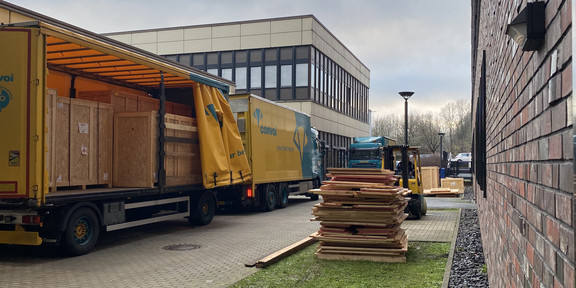TU Dortmund Welcomes Humboldt Professor Edvardas Narevicius
- News

Prof. Edvardas Narevicius is a pioneer in the experimental investigation of quantum effects in molecular collisions, which can only be detected at extremely low temperatures close to absolute zero. Many students and researchers from the Department of Physics made their way to the Physics Colloquium in November to attend his first lecture at TU Dortmund. After a brief welcome by Prof. Mirko Cinchetti, Vice Dean of the department, Prof. Narevicius spent about an hour explaining his research to the audience. He is one of the pioneers of ultra-low temperature chemistry. His basic research on quantum effects in molecular collisions has gained him an international reputation in the field of chemical physics. His research promises to improve our understanding of physical processes and chemical reactions.
In his experiments, he uses many novel approaches to observe molecular collisions. Unlike in standard particle accelerators like CERN, however, this does not occur at very high temperatures but just above absolute zero, i.e., at approx. -273 °C. This low temperature is critical to reveal subtle quantum effects that dominate reactions where molecules start behaving as waves and not particles. There are many surprises where quantum nature plays a key role. For example, quantum tunneling allows particles to overcome energy barriers – thus, a reaction at -273 °C may become as fast as at the room temperature. Prof. Narevicius reaches the lowest collision energies by manipulating the velocities of atoms and molecules using high magnetic fields. With the help of this method, he has been able to make far-reaching contributions to molecular physics and chemical dynamics at the lowest temperatures as well as observe and analyze long sought after quantum effects.
Research funded by the European Research Council
Together with his wife, engineering physicist Julia Narevicius, he developed the sophisticated experiment which is funded by the ERC Advanced Grant from the European Research Council in 2020. This apparatus facilitates groundbreaking new research that could be just as relevant for astrophysics as for quantum chemistry or quantum IT. Most of the equipment has now been brought to Dortmund from the Weizmann Institute of Science in Israel – where Narevicius had been researching since 2008 – and is ready to be set up here.
The new professorship named “Ultracold Reactions” has been assigned to the UA Ruhr “Chemical Sciences and Sustainability” Research Center. The Center aims to understand chemical products, processes and reactions at the molecular level and utilize this knowledge for environmentally friendly and economically competitive innovations. The chemical industry is consequently as much in its focus as building materials production and pharmaceuticals. At the same time, the new professor is already an associated member of the “RESOLV – Ruhr explores solvation” Cluster of Excellence, which Ruhr-Universität Bochum and TU Dortmund University have been jointly supporting since 2019.
Research Alliance Ruhr
The Research Alliance Ruhr was initiated as part of the Ruhr Conference of the state government of North Rhine-Westphalia to expand the top-level international research of TU Dortmund University, Ruhr-Universität Bochum and the University of Duisburg-Essen, all of which cooperate in the UA Ruhr. Founded in 2021, the Research Alliance is made up of four interuniversity Research Centers: “One Health Ruhr”, “Chemical Sciences and Sustainability”, “Trustworthy Data Science and Security” and “Future Energy Materials and Systems”. On top of that, a “College for Social Sciences and Humanities” was also established. The state government of North Rhine-Westphalia has committed to supporting the development phase until 2024 with 75 million euros in funding.



